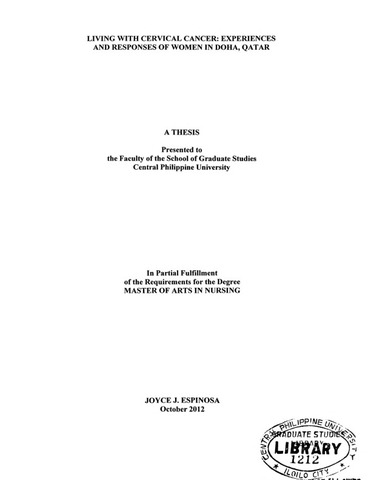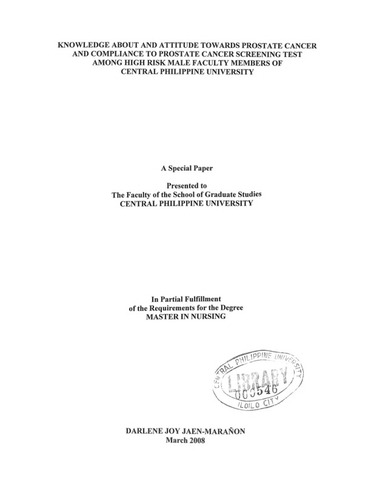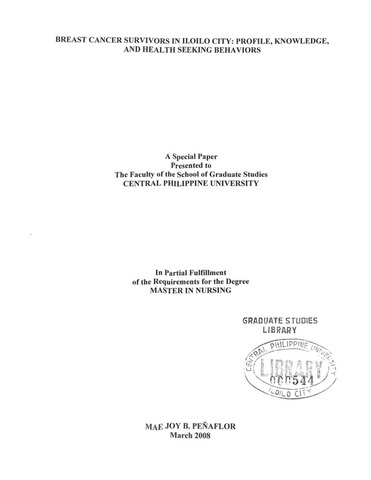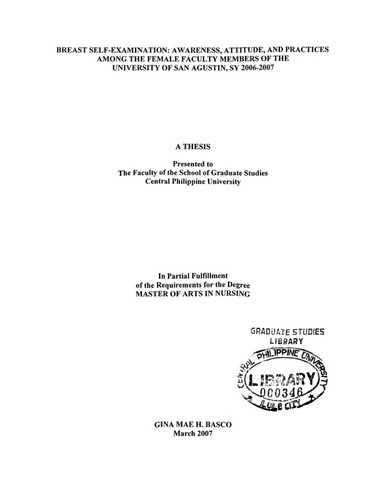Living with cervical cancer: Experiences and responses of women in Doha, Qatar
요약
This is a qualitative research-case study approach, guided by phenomenology. The participants of the study were the ten (10) women diagnosed with cervical cancer. Data collection techniques were key informant interviews and observations using field notes, personal journal, and audio-tape. Furthermore, data collection for this study consists of a face-to-face, conversational semi-structured interview with each of the participants using an interview guide.
To ensure rigor in qualitative research, the study was guided by the procedures deemed suitable and explicit for qualitative research by Lincoln and Guba. The confidentiality, informed consent, and ethical considerations were greatly observed. Data were analyzed using Colaizzi’s Phenomenological Approach.
Major Findings
1. The participants were the ten women diagnosed of having cervical cancer. The youngest of them is 38 and the oldest is 62. Seven were Filipino and the three other were Indonesian, Pakistani, and Indian. All of them are married and working.
2. Six of the participants were college educated, while four of them were high school educated.
3. Five of them have one to two children, three have four to five, and two of the participants have no child.
4. All of them were diagnosed of cervical carcinoma, specifically, basaloid and squamous cell carcinoma. One of them was diagnosed of having mixed type of cervical carcinoma.
5. Six of the participants were diagnosed of stage I cervical cancer, two of them were stage II, and the two others were stages III and IV. Six had been diagnosed of cervical cancer of one to two years and four of them were three to five years.
6. Common manifestations of the women include irregular, profuse vaginal bleeding, loss of weight, nausea and vomiting, pain after sexual activity, pelvic pain, fatigue, and weakness.
7. All of them have undergone chemotherapy and radiation. Eight ofthe women went into brachytherapy and five had surgery.
8. All of the participants experienced inability to sleep, eight of them complained that they lost their appetite, and six had immense weight loss. Four of them complained of dizziness and fatigue. Their descriptions of these responses, however, varied in length and frequency.
9. All of them cried upon knowing the diagnosis, they experienced sadness, a tremendous shock, denial, and worried a lot. Others were anxious about their children as well as their future. Some resulted to depression.
10. The five top most physical effects of chemotherapy were alopecia or hair loss, nausea and vomiting, loss of appetite and weight loss, and tiredness and easy fatigability.
11. Emotionally, they handled it with acceptance, thinking positively, and being acquainted with the treatment plan. Most of them were distressed, some of them, were scared, afraid, and bothered with the effects of the treatment.
12. Accepting the diagnosis and the willpower to face the illness, live, and survive were apparent on their responses with recovery.
13. In terms of coping and adaptation, reliance on seeking information, praying, accepting the disease, complying with treatment such following physicians’ recommendations, and support of family members, relatives, and friends to cope with the diagnosis are prominent clusters in the experience of women with cervical cancer.
14. A supportive husband was an important to all participants.
15.All of them prioritized their concerns with regards to their lifestyle such as choosing the appropriate food to eat, engaging self to physical activity, sleeping for eight hours or more in a day, and managing time effectively. Some tend avoid crowded places and others would do relaxation through meditation.
16. All of the participants expressed their view that they had discovered certain positive gains from the disease experience. They also made adjustments about the meaning in life, the future, and what they expected from the future, recognized an increase in spiritual presence in their lives, and others explained that their cervical cancer as strong “fate and hope” to live. Furthermore, all resorted to have finding meaningful time to self, family, and significant others as well.
17. The analysis of data resulted in six themes being identified. These are Facing the Discovery and Diagnosis of Cervical Cancer, Responses to Treatment: The Good, the Bad, and the Scary, Moving On: The Road to Recovery, Doing and Seeking with Something: Coping and Adapting, Changing Lifestyle: Making a Priority, and Finding Meaning in Disease and Future Views
Conclusions
1. The discovery and diagnosis of cervical cancer was an emotionally and physically painful for the participants.
2. The emotional effects of the therapy can be just as debilitating as the physical effects.
3. The women looked their treatment beyond physical illness but possessing a healing effect to their emotional and spiritual life.
4. A prayerful life and its subsequent hopeful attitude and acceptance of the disease strengthen their will to live and survive.
5. Despite the challenges of cervical cancer, women found opportunities for coping, adaptation, and growth.
6. These women believe that these lifestyle changes improved their health and well-being.
7. Being diagnosed with cervical cancer provided these women with an opportunity to reflect back on their lives to make changes for their personal growth and emotional well-being. Further, dynamic and interactive processes through which they respond to changes in the family, cope with cancer, and demonstrate a sense of purpose that continues overtime.
8. The themes from this study are substantially eminent in understanding women’s experiences and responses to cervical cancer.
Recommendations
Based on the result of the study, the researcher presents the following recommendations:
Women Diagnosed with Cervical Cancer. Cervical cancer information should be intensified. It should not only include the signs and symptoms for its early detection, the various treatment and their side effects and self care to be practiced correctly but also to present these in a positive perspective through stories of faith, hope, strength, and love of the cancer survivors.
Husbands, Family Members, Relatives, and Friends. They should provide adequate support and assistance which would improve the comfort level to cope with the physical and emotional stresses associated with the illness.
Ministry of Health of Qatar and Department of Health of the Philippines. Emphasis must be given to cervical cancer programs and treatment. Providing new programs that could give information about the psychological, emotional, and spiritual needs of women with cervical cancer. Establishing of counseling and psychological support services in the hospitals and cancer centers are recommended. Al-
Amal and Women’s Hospitals in Doha, Qatar, the programs for cervical cancer should be accentuated, thus providing comprehensive and compassionate care for these women. Health Care Professionals. Health Care Professionals should better understand experiences to cervical cancer so that they approach and care for these individual more effectively. Care must provide greater consistency and continuity throughout the whole trajectory of care. They can be involved in the client’s life by simply listening to their stories and hearing the pains and joys, journeying with them through discussion and reflection about their life to a discovery of meaning.
This study left us many aspects of a life affected by cervical cancer that other researchers can explore such as the experience of reciprocal interaction with the patient by the family, relatives, co-workers, friends, and medical and health team.
기술
Abstract only
추천 인용
Espinosa, J. E. (2012). Living with cervical cancer: Experiences and responses of women in Doha, Qatar (Unpublished Master's thesis). Central Philippine University, Jaro, Iloilo City.
유형
Thesis주제
키워드
학과
School of Graduate Studies정도
Master of Arts in Nursing선반 위치
GSL Theses 610.73072 Es65
물리적 설명
xvi, 82 leaves
Collections
Related items
Showing items related by title, author, creator and subject.
-
Knowledge about and attitude towards prostate cancer and compliance to prostate cancer screening test among high risk male faculty members of Central Philippine University
Marañon, Darlene Joy Jaen (2008)This is a descriptive relational study on the knowledge about and attitude towards prostate cancer and compliance to prostate cancer screening test among high risk faculty members of Central Philippine University. A one-shot ... -
Breast cancer survivors in Iloilo City: Profile, knowledge, and health seeking behaviors
Peñaflor, Mary Joy B. (2008)This study was conducted to determine the level of knowledge about breast cancer and health seeking behaviors of breast cancer survivors in Iloilo City. The respondents of this investigation were all the 43 breast cancer ... -
Breast self-examination: Awareness, attitude, and practices among the female faculty members of the University of San Agustin, SY 2006-2007
Basco, Gina M. (2007)This study determined the level of awareness, attitude and practice regarding breast self-examination of the female faculty members of the University of San Agustin, for the School Year, 2006-2007. A descriptive-relational ...







